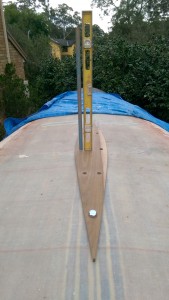The hardwood shoe which fits between the hull and the steel keel is fitted to the hull. It sits on top of a 2 mm thick layer of high strength epoxy glass which is part of the additional reinforcement I have included in the construction of our Didi 40 CR. I had already drilled pilot holes for the keel bolts but I checked and rechecked every part of the way as I drilled the full size 25 mm holes through the keel and keel support frames.
It took the best part of a day and a half to drill the eight holes, fasten the hardwood shoe down with two of the keel bolts and prepare the plywood capping for the centre line reinforcement. The photo shows the two keel bolts temporarily holding the keel shoe until the glue dries. The bolt have been wound around with packaging tape so that they come out to the full diameter of the holes and there is no movement of the shoe while glue sets. The packaging tape is also excellent mould release material and the bolts should be able to be removed even if some epoxy had oozed onto the tape.
The plywood capping pieces have to be shaped around the keel and also splice joined along the length so it took a couple of hours to do that effectively. Tomorrow the plywood will be glued down ready for the final shaping back to the original hull “V”. Also completed is the reinforcement where the 70 mm diameter stainless steel rudder shaft goes through the backbone. Two pieces of spotted gum hardwood have been glued in either side of the backbone making a very solid structure to support the loads on the rudder shaft.



